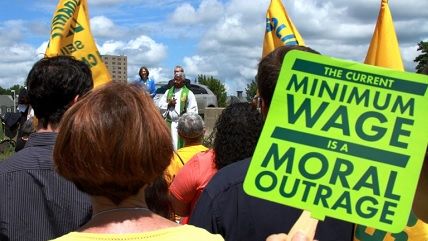When Did the U.S. Repeal the Laws of Supply and Demand?
Of soda taxes and minimum wages.

Back in October, The New York Times reported that the law of supply and demand still works. "Yes, Soda Taxes Seem to Cut Soda Drinking," the newspaper told its readers, relating the results of Mexico's new tax on sugary beverages. Mexico's measure imposed a 10 percent tax on soft drinks, and so far has cut consumption from 6 percent to as much as 17 percent among the poorest Mexicans.
The efficacy of the soda tax comes as no great surprise. After all, as the news story noted, "the idea for the soda tax is in some ways modeled on… tobacco taxes… A robust literature now exists showing that the resulting higher prices really did push down cigarette sales, particularly among young people."
The paper's editorial page soon came out in full cry demanding higher soda taxes for Americans, too. Noting that "a big tax on sugary drinks in Mexico appears to be driving down sales of soda," the editors urged "lawmakers in the United States to consider comparably stiff taxes."
Some already have. Soda taxes have become a chic cause in progressive enclaves, from Berkeley and San Francisco to Philadelphia and New York.
But if you want to make liberal heads in those same enclaves explode, dare to suggest that raising the minimum wage might reduce employment.
Thanks to legislation their governors signed Monday, California and New York are hiking their minimums to $15, the target hourly rate of a national campaign by labor activists. Earlier this year The Times encouraged Hillary Clinton to join Bernie Sanders in demanding a $15 minimum for the entire country. "Mrs. Clinton has argued that $15 might be too high for employers in low-wage states, causing them to lay off workers or make fewer hires," the paper noted, but then argued: "There is no proof for or against that position."
Sure there isn't—not if you don't remember the argument for soda taxes, anyway.
True, soda and labor—like everything else—have different price elasticities. When an economic good has a high degree of price elasticity, a small change in price can produce a big swing in demand. This usually applies in cases of luxury goods such as movie tickets—or soft drinks. Other economic goods with lower price elasticity might not suffer weaker sales even if the price skyrockets. For example, you'll eagerly buy the last parachute on a falling airplane whether the price is $1 or $1,000. It's safe to say employers consider low-skilled labor more desirable and less easily replaceable than a can of soda, but less desirable and more easily replaceable than the last parachute on a falling airplane.
But it does not follow that because we can't know exactly how much the $15 minimum—the highest minimum in the world—will affect employment, we therefore can't know if it will affect employment at all. Yet you can find that very argument lots of places. This is on the order of saying that because we can't know how many people a thermonuclear strike on Manhattan would kill, it's premature to say it would kill lots of people, or even anyone. Hey, you never know!
We do have some preliminary evidence, though. Several large U.S. cities recently have enacted stiff hikes in the minimum wage, and—surprise!— jobs have disappeared.
In D.C., Walmart abandoned plans for two new stores, and employment in the leisure and hospitality industry went from 3 percent growth to zero. Investor's Business Daily does the math and finds that "restaurants, hotels and other employers went from adding 2,000 jobs to adding zero."
In San Francisco and Oakland, Calif., employment growth has been cut in half. In Seattle, job growth has plunged from 4.6 percent to 1.8 percent—even while restaurant hiring rose more than 6 percent for the rest of Washington State.
Sure, you can find studies that purport to show small hikes in the minimum wage don't hurt jobs. You can find a lot more that say they do. But the more honest advocates for a higher minimum wage acknowledge that it will cost some people their jobs. But some argue that's no big deal and might even be a feature, not a bug: "What's so bad about getting rid of crappy jobs?" asks public-policy professor David Howell.
Which is easy to say if the job being gotten rid of isn't yours.
This column originally appeared at the Richmond Times-Dispatch.


Show Comments (178)